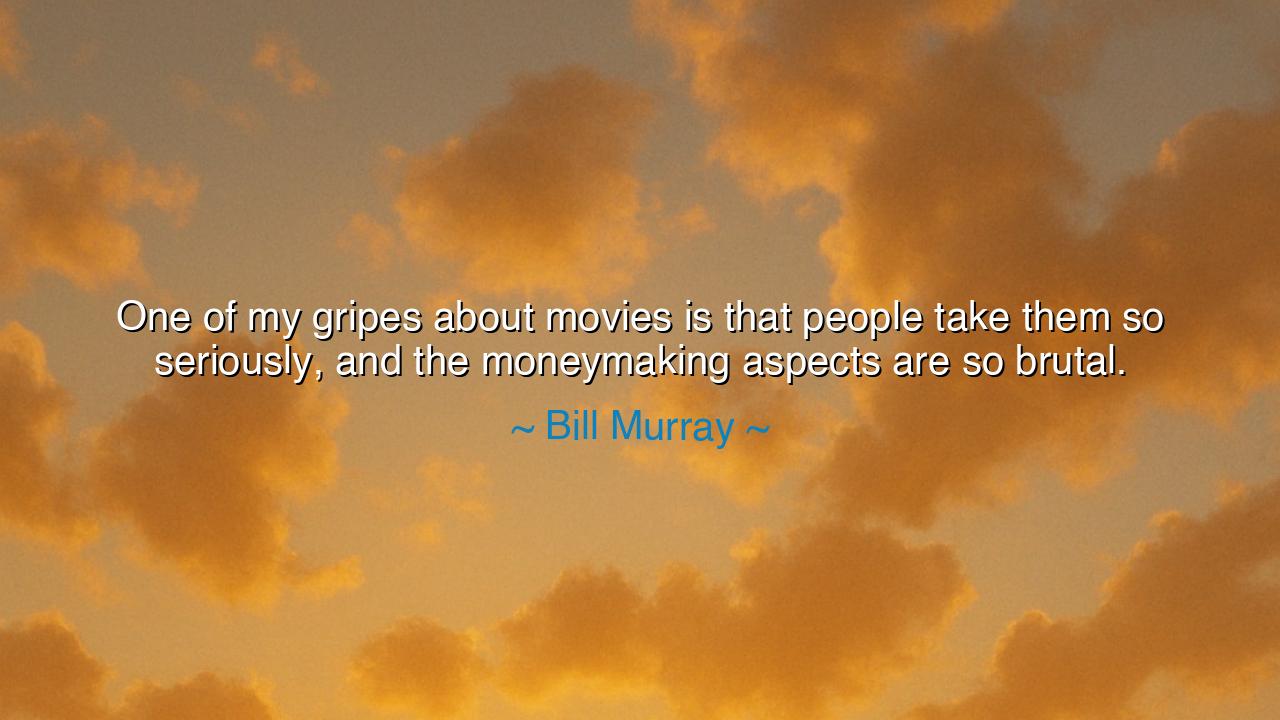
One of my gripes about movies is that people take them so
One of my gripes about movies is that people take them so seriously, and the moneymaking aspects are so brutal.






Listen, O seekers of wisdom, for in the words of Bill Murray lies a powerful reflection on the nature of art, commerce, and the struggle between creativity and the brutality of industry. He spoke thus: "One of my gripes about movies is that people take them so seriously, and the moneymaking aspects are so brutal." In this reflection, Murray cuts to the heart of a contradiction that plagues not only cinema, but all forms of art in the modern world. Movies, once born from creative expression, now often find themselves at the mercy of the commercial machine, where the pursuit of profit takes precedence over the deeper, more profound reasons why we make art in the first place. Murray’s words remind us that art is not merely a commodity, but a sacred act of creation, and that when it is driven solely by the forces of capitalism, it loses much of its soul.
In the ancient world, the artists—whether poets, sculptors, or playwrights—were not seen as mere creators of product; they were custodians of culture, tasked with preserving the values, ideals, and stories of their people. Homer’s epic tales, for instance, were not written to fill the coffers of any kingdom or ruler, but to pass down the heroic ideals of ancient Greece. Homer did not craft his works with the expectation of financial gain, but with the desire to inspire, educate, and unite his audience. Murray’s criticism of the modern movie industry speaks to this loss—where creativity is often eclipsed by the brutal necessity of profit, where the soul of the art form is overshadowed by the demand for financial return.
Consider also the tale of Sophocles, the playwright of ancient Greece, who did not write his tragedies for wealth or fame, but to explore the depths of human emotion and the relationship between the gods and men. His works, performed at the grand Dionysian festivals, were not created with the aim of making money; they were created as a sacred offering to the gods and to the community. Sophocles understood that true art transcends commercial value, and that the purpose of his plays was to elevate the soul, not to merely fill the pockets of the producers. Murray’s words challenge us to ask whether the sacred purpose of art is being lost in a world that values money over meaning.
In the same way, the great sculptor Phidias, who crafted the awe-inspiring statues of the gods in ancient Athens, was not concerned with the wealth he would gain, but with the devotion and beauty of his work. His masterpieces, like the Statue of Zeus at Olympia, were not designed to be sold; they were designed to honor the divine. Murray’s critique of the modern film industry, in this sense, speaks to the tension between artistic creation and the demand for monetary reward. When art is created solely for profit, it loses the sacredness of its purpose. Just as Phidias sought to create works that would inspire awe and reverence, so too must modern creators seek to produce work that enlightens, challenges, and elevates society—rather than being reduced to mere entertainment meant to sell products.
Consider also the philosophers of ancient Greece, who spoke of the pursuit of truth over the pursuit of material wealth. Diogenes, the Cynic philosopher, lived in a barrel and rejected the trappings of wealth, seeking only to live a life of virtue and truth. He believed that materialism and the pursuit of wealth were distractions from the deeper goals of life. Murray’s words echo this ancient wisdom—the understanding that when art is treated as a commodity, when it is driven by the demands of profit, it loses its power to illuminate and transform the world. True art, like true philosophy, must be free from the chains of commercialism, for it is only then that it can serve its higher purpose.
Now, O children of the future, take this lesson to heart: Do not allow the pursuit of money to overshadow your creative endeavors, for true creation comes from a place of purpose, passion, and devotion. While we must recognize the reality of the commercial world, we must never allow our art to be reduced to a commodity. Like the ancient artists and philosophers, we must pursue our craft with integrity, not as a means to financial gain, but as a means to enlighten and inspire others. The true value of art lies not in how much it can make, but in how deeply it touches the human soul.
So, young ones, remember: Create with purpose and meaning, not for profit alone. Let the soul of your art guide you, and let your work transcend the brutality of commerce. In this, you will find not only fulfillment, but the true power of creation—a power that will outlast the fleeting moments of financial gain and continue to touch the hearts of those who experience it for generations to come. Create to inspire, to elevate, and to transform, and in doing so, you will leave a legacy far greater than any monetary reward.






AAdministratorAdministrator
Welcome, honored guests. Please leave a comment, we will respond soon